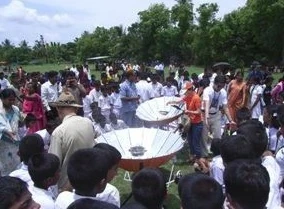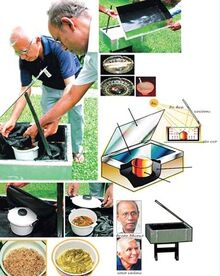Paul Hedrick (talk | contribs) |
Tom Sponheim (talk | contribs) m (→Resources) |
||
| Line 81: | Line 81: | ||
===Reports=== |
===Reports=== |
||
===Articles in the media=== |
===Articles in the media=== |
||
| + | |||
| − | [[File:No_fire,_fuel,_wondeful_solar_cooking.jpg|right|400px]] |
||
| − | [[File:No_fire,fuel,_wonderful_solar_cooking_group_photo.jog.jpg|thumb| |
+ | [[File:No_fire,fuel,_wonderful_solar_cooking_group_photo.jog.jpg|thumb|220px|[http://www.rivira.lk/2011/01/09/rivinetha1.htm No Fire, No Fuel, - Wonderful Solar Cooking]]] |
| − | *'''January 2011:''' [http://www.rivira.lk/2011/01/09/rivinetha1.htm No Fire, No Fuel - Wonderful Solar Cooker] |
+ | *'''January 2011:''' [http://www.rivira.lk/2011/01/09/rivinetha1.htm No Fire, No Fuel - Wonderful Solar Cooker] |
*'''January 2011:''' [http://scienceray.com/technology/solar-cookers-for-sri-lanka/ Solar Cookers for Sri Lanka] - ''Scienceray'' |
*'''January 2011:''' [http://scienceray.com/technology/solar-cookers-for-sri-lanka/ Solar Cookers for Sri Lanka] - ''Scienceray'' |
||
*'''April 2009:''' [http://www.islamonline.net/servlet/Satellite?c=Article_C&cid=1157365898565&pagename=Zone-English-HealthScience/HSELayout Sri Lanka's Sun in a Box!] - ''Islam Online'' |
*'''April 2009:''' [http://www.islamonline.net/servlet/Satellite?c=Article_C&cid=1157365898565&pagename=Zone-English-HealthScience/HSELayout Sri Lanka's Sun in a Box!] - ''Islam Online'' |
||
Revision as of 19:15, 28 January 2013
Events
News and Recent Developments
- January 2013: EMACE continues to promote solar cooking with rural villagers - Fifteen solar box cookers will be distributed at the completion of a training workshop to be held in the Bolgoda Lake catchment area in the western province of Sri Lanka. The project was developed with a partnership with the Lake Biodiversity Project funded by the Global Nature Fund (GNF). Three additional programs are scheduled with other development non-profit organizations in northern and eastern locales for re-settlement villagers.

Iseko SHRAI with Sarvodaya representative, 2010

Sarvodayo demonstration, 2010

Sarvodayo demonstration, 2010
- May 2010: Iseko Shrai, from the Japan Solar Energy Education Association met with local representatives of the Sarvodaya foundation in Sri Lanka, to provide solar cooking demonstrations in several villages recovering from tsunami damage. The demonstrations were received enthusiastically, and JSEEA was able to donate a parabolic solar cooker to each village.

Workshop participants at Trincomalee, November 2009.
- November 2009: A workshop on "Renewable energy at village level" was held in Trincomalee on November 25, 2009 at Grace Church vocational center, for 100 newly-resettled families under the sponsorhip of a local NGO. More details here.
- July 2004: The EMACE Foundation continues its efforts to spread solar cooking in Sri Lanka, particularly war-torn northern and eastern regions. Workshops were recently held in the Vavuniya district and orders for 50 solar box cookers were filled. Twenty parabolic solar cookers ― designed and provided by Dominic Michaelis of Solar Energy Limited ― were also distributed. According to EMACE, “Women in particular are benefiting from the cookers as they enable them … to spend more time away from cooking and to save money otherwise spent on firewood. Many have used the extra time and money to start their own micro-businesses ― some have even used the cookers themselves to gain extra income by selling cakes and sweets prepared in them.” Demand for cookers among these communities is currently outstripping supply. EMACE is looking for additional support to assist with production and transport costs. EMACE recently began to produce its own solar box cookers, helping to keep costs down and ensure the project’s viability.
The History of Solar Cooking in Sri Lanka
A solar cooking project was established in Sri Lanka in 2001 by E. Abeyrathne of that country's non-profit organization, EMACE. The country is very suitable for solar cooking, with good annual sunlight, an everdiminishing supply of wood and a large proportion of people living in rural areas. Twenty-one percent of the country's land area is forested (FAO, though more recent estimates of the National Geographic Society suggest 17%, with a substantial rate of decrease {-1.6%}, from what was estimated as -261- around 84% in 1880). Alternative fuels are very scarce, and the nation's civil wars have created scarcities of many kinds along with substantial violence and economic instability.
EMACE is an NGO in Sri Lanka. In early 2000 the organization contacted Solar Cookers International to inquire about how the organization could go about introducing solar cooking to the people of Sri Lanka. After several interchanges, EMACE director Abeyrathne went on-line with the solar cooking discussion group and posted a request for experienced solar cooks to come to Sri Lanka to help. Two Canadians, Lee Sentes and Kathleen Manion, were at the same time looking for just such an opportunity. The two had recently returned from a project assessing solar cooking suitability in Madagascar and had good experience to share.
They spent eight months in Sri Lanka, providing skills training to EMACE staff and to villagers in four separate locations in Sri Lanka, based on criteria which included: amount of sunlight, shortages of fuel, levels of deforestation, and villager income.
Workshops on how to build, use, and maintain solar cookers were conducted, In addition, several larger cookers were built for bakeries and to serve the needs of refugees living in camps. Public interest in the work was very high, with extensive coverage by various media. EMACE also brought a range of other organizations into the work, including women's groups, to further spread knowledge of solar cooking. In the original project, a simple box cooker design was used; the device is relatively easy to make in a village, using locally available materials and workmen.
Village groups quickly had distributed over 50 cookers. Later, carpenters were found who would make the wooden box cookers used in the project, and distribution for these and other solar products were started in the cities. All profits from these centers were funneled back into the project to allow sustainability and hopefully, expansion.
Later the project expanded to 11 villages. Part of their planning included purchase of machinery which permit them to make other wood products such as furniture, as well as the cookers, as a way of funding the organization's future. Sri Lankan solar cooks are working on a solar cookbook that shows ways to adapt traditional Sri Lankan foods to cooking with the -262- sun. The possibility of demonstrating other varieties of cookers has also been discussed; a French variety of parabolic is under consideration.
A planned follow-up evaluation has yet to occur, but a reply to a 2000 SCI survey indicated continuing growth in the program. EMACE is clearly the largest ongping solar cooking program, but another group also works in the country, the Saviya Development Corporation which indicates it produced and distributed over 100 cookers in 2003. The recurring hostilities in the country do not make any of the work easy, but the need is substantial and most ingredients for success appear to be in place.
[Information for this section was taken originally from State of the Art of Solar Cooking by Dr. Barbara Knudson]
Climate, Culture, and Special Considerations
Solar Cookers International has rated Sri Lanka as the #22 country in the world in terms of solar cooking potential (See: The 25 countries with the most solar cooking potential). The estimated number of people in Sri Lanka with fuel scarcity but ample sun in 2020 is 2,300,000.
See also:
Resources
Reports
Articles in the media

- January 2011: No Fire, No Fuel - Wonderful Solar Cooker
- January 2011: Solar Cookers for Sri Lanka - Scienceray
- April 2009: Sri Lanka's Sun in a Box! - Islam Online
Contacts
The entities listed below are either based in Sri Lanka, or have established solar cooking projects there:
SCI Associates
- Main article: Solar Cookers International Association
